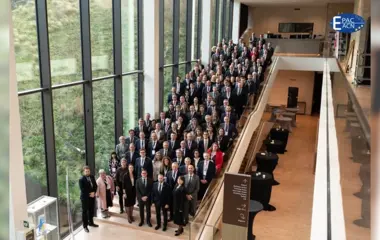The National Agency on Corruption Prevention (NACP) continues to report on the results of the work of the "rebooted" NAPC 2.0, whose anniversary is in mid-January 2024.
One of the NACP's important areas of work is raising awareness and understanding among public officials of how anti-corruption mechanisms work. This is facilitated by the NACP's explanations and consultations, in particular on declaration and conflict of interest.
"We realize that the issues of declaration and conflict of interest are quite complex. At the same time, we are convinced that the interaction between citizens and the government should be comfortable. Over the past four years, the NACP has been working to explain complex things with simple words, increase customer focus, and digitize processes as much as possible. We responded quickly to both legislative changes and other factors (first of all, the full-scale invasion that began in the midst of the declaration campaign) that led to the need to provide information support to public officials," said Ilona Katushynska, Head of the NACP's Department for Formation of Legal Positions on Declaration and Conflict of Interest.
Since 2020, the NACP has been constantly improving its approach to providing explanations and methodological recommendations. Since then, they have become clearer and easier to use. In an effort to make the processes of filling out the declaration and identifying and resolving conflicts of interest easy and understandable, we are guided by business standards:
1) improve products and services, including the Declaration Register;
2) publish convenient instructions for using products and services—explanations and guidelines;
3) provide verbal consulting assistance to those who need it;
4) collecting feedback from users to improve processes, products, and services.
Thus, in 2020, the NACP team provided four comprehensive explanations on declarations and also created a customer assistance department (contact center) that provided telephone consultations on declaration issues.
In 2021, the hints to the fields of the electronic declaration form were updated, and, for the first time, descriptions of its sections were made with links to explanations and useful state registers that could be useful when filling out a particular section. During this period, two versions of comprehensive explanations on declaration and new guidelines on conflict of interest were also approved.
A Knowledge Base was created, an information resource that contains all the explanations, guidelines, and other useful materials. Since then, anyone has been able to find answers to questions on their own at any time. Thanks to the Knowledge Base, the number of calls to the contact center decreased by more than three times compared to 2020.
The Contact Center also developed and expanded the range of issues on which consultations were provided. Also, we increased the number of service channels and introduced consultations via email and social media. The contact center unit became the first line of service, a "one-stop shop" where NACP clients could get answers to most questions related to the Agency's activities. A business process for escalation of complex and unusual issues (second line of support) was developed with subsequent informing of clients. A CRM system was implemented, which allowed us to optimize service processes.
The full-scale invasion in 2022 began in the midst of the declaration campaign. The NACP team promptly approved new clarifications on the most relevant topics at the time and also ensured that the contact center could be contacted after martial law was declared in the country.
The National Agency introduced customer service standards, monitoring their compliance and assessing the professional knowledge of contact center employees, updated the guidelines on conflict of interest, and added more examples of practical application of the law.
Due to the postponement of the obligation to file declarations, 2023 became a year of opportunities—the NACP was able to significantly improve its products and services.
The process of updating the hints to the fields of the Declaration Register has begun (the hints are formulated on the basis of a data-based approach and feedback from declarants, their needs, and their pains; hints will be added to all fields of the declaration form); links to video explanations on how to fill out specific sections of the declaration have been integrated into the Declaration Register. This way, declarants can find answers to frequently asked questions directly in the Register of Declarations without having to search for them on other resources.
The platform, design, and structure of the Knowledge Base have been updated: information search has been optimized, the content has been streamlined, the ability to view previous versions of the explanations has been added, and the option to analyze statistical information has been implemented. Users can now evaluate a particular explanation and provide feedback.
The guidelines on conflict of interest and other restrictions were updated and approved in January 2024.
In the area of clarifications, priority was given to their timeliness and convenience, prompt updating in accordance with the dynamics of legislative changes, and supplementation based on requests from declarants. Therefore, the clarifications updated after the resumption of the declaration contain more than 60 new and almost 80 amended or added items.
During 2022-2023, the NACP team developed three online tests that helped identify conflicts of interest and determine who to report them to, as well as the best way to resolve them.
In March 2023, the NACP launched the practice of surveys on the experience of interaction with the Register and the NACP Knowledge Base. The survey is anonymous and is contained in an email sent to each declarant after submitting an electronic declaration.
In March 2023, the NACP launched the practice of surveys on the experience of interaction with the Register and the NACP Knowledge Base. The survey is anonymous and is contained in an email sent to each declarant after submitting an electronic declaration.
The analysis of the results of the customer experience survey in December 2023 showed that public officials have improved their assessment of the declaration procedures. In particular, the vast majority of declarants are satisfied with their interaction with the Registry; 70% of respondents rated such interaction at 8–10 points on a 10-point scale, including 36.5% who rated it at 10 points.
At the same time, the survey showed a significant benefit from the NACP's services when filling out declarations. Such a tool as hints in the declaration helped almost 90% of declarants, and the Knowledge Base helped more than 70% of public servants fill out the declaration form. In general, thanks to the National Agency's services, 64% of declarants took up to several hours to fill out the declaration form. This is the best evidence of the effectiveness of the NACP's client-oriented approach to interaction with public officials and confirms the need for further development of these practices and resources.
As a reminder, we have reported on the NACP's work to improve and simplify the declaration process in 2020–2023, despite the one-and-a-half-year suspension of mandatory declaration and the ban on inspections caused by the war.
The analytical report on the NACP's work over four years (2020–2023) is available here.









